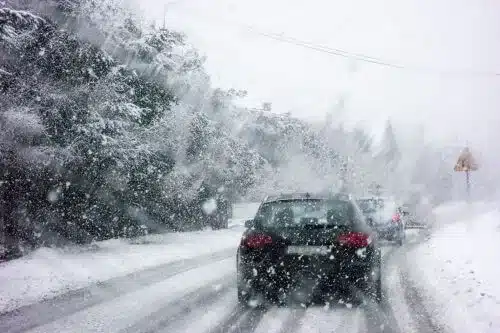
Have you been involved in an auto collision? Contact Ali Awad, ‘The CEO Lawyer’ and his team of experienced personal injury attorneys at the CEO Lawyer Personal Injury Law Firm by calling (470) 323-8779 or contacting us online to receive your free and confidential case evaluation. Attorney Ali Awad, ‘the CEO Lawyer,’ established the CEO Lawyer Personal Injury Law Firm and quickly turned it into one of the fastest-growing law firms in the country. If we take your case, you won’t pay anything until we win.
Weather Related Accidents
Georgia weather is known to have a significant impact on travel conditions and has led to numerous weather-related accidents. Georgia weather conditions such as heavy rain, wind, fog, and snow can lead to major road collisions. Bad weather significantly increases the chance of being involved in an accident due to reduced visibility, decreased vehicle performance, and driver distraction. Therefore, to avoid getting involved in an accident when driving in inclement weather conditions, consider taking the following actions:
Ensure Car Is Ready To Drive
Ensuring that your vehicle is kept in good working order is pertinent to avoiding breakdowns in adverse weather. Keep your car in good working order by regularly maintaining your vehicle. Dropping temperatures may lead to reduced tire pressure, drained batteries, and other cold-weather-related issues. Experiencing a breakdown in adverse weather conditions can be extremely dangerous.
Plan Your Route
Before leaving home, use a device to check your route and weather conditions to plan your travels accordingly. You should note road shutdowns, accidents, and any dangerous conditions. Knowing what road conditions and delays to expect can help you plan your time accordingly. During adverse weather, it is never the time you should consider rushing in traffic or while driving.
Avoid Nighttime Driving
Driving at night in adverse weather is extremely dangerous. In winter weather, ice is more likely to form and be less visible as temperatures dip. As patches of ice may be less visible at night, it may be too late to take corrective measures to prevent a severe crash. Additionally, with severe rain or wind, visibility at night will be further decreased, and obstructions in the road may become less visible. Therefore, it is suggested to avoid driving at night when adverse weather is present.
Slow Down
It is imperative to take it easy and slow down when driving on wet, slick, icy, or snow-covered roads. It is recommended that when driving in wet or winter weather conditions that drivers slow down their speeds by about half. In these conditions, it can become more difficult for drivers to slow down and control their vehicles or respond to cars ahead. Additionally, it is suggested that you do not use cruise control on slick or wet roads and increase your following distance behind cars to 8-10 seconds.
Be Prepared for Emergencies
Inclement weather is a leading cause of car collisions. While a driver can take every precaution to stay safe, collisions can still happen. Inclement weather conditions can be dangerous, especially as they may delay emergency response time from police or EMTs. Therefore, drivers should be prepared for potential emergencies and ensure that their vehicles are equipped with emergency items such as a first aid kit, flashlights, jumper cables, water, blankets, flares, and more.
Seeking Help from an Attorney
If you have been involved in a weather-related accident in Georgia, you may require extensive medical care, miss time from work, sustain property damage, and suffer other damages. If you have sustained damages due to another driver’s negligence or from a weather-related crash, you may be entitled to compensation. It is recommended to consult with an experienced Georgia car accident attorney to discuss your options for recovering compensation for your damages. Alternatively, if you have caused injury to another driver or their property due to inclement weather, you must prove that your driving in the moments before the crash reflected reasonable action and that you completed the most reasonable course of action under the circumstances to not be held liable.
Therefore, if you have been involved in an accident caused by inclement weather in Georgia, it is important to discuss your case with an attorney as soon as possible. You will have a limited amount of time to file a car accident claim, otherwise known as a “statute of limitations.” Your Georgia car accident attorney will file your claim within the necessary deadlines, help establish fault in your car accident case, and help defend you in the event you are sued for an accident caused by inclement weather.
Car Accidents Caused by Weather Conditions
Unfortunately, in today’s climate, severe weather conditions can arise suddenly and can easily lead to injurious car accidents, which may even be life-threatening. Georgia weather conditions are known to impact roadways and traveling conditions significantly. The following statistics have been found regarding car accidents caused by weather conditions:
- It is estimated that 22% of accidents are caused by inclement weather conditions
- Nearly 445,000 injuries and 6,000 deaths occur annually due to inclement weather
- When it comes to weather-related accidents, wet weather (rain & wet pavements) are the leading cause of crashes
- Over 200,000 collisions annually are caused by snow
Personal Injury Attorney
Has a negligent driver injured you or a loved one? Or have you been involved in an accident due to inclement weather? If so, do not wait to contact the experienced car accident personal injuries attorneys at the CEO Lawyer Personal Injury Law Firm. Call us today at (470) 323-8779 or contact us online to receive your free and confidential case evaluation.
If you have been injured due to another driver’s negligence, it should not be your burden to be responsible for your damages. Contact Ali Awad, ‘The CEO Lawyer’, and his team of experienced attorneys today to see what we can do to assist you.



